Organisational Behaviour Report
VerifiedAdded on 2020/12/30
|16
|4026
|56
Report
AI Summary
This report analyzes the impact of organisational culture, politics, and power on individual and team behaviour and performance within Ryanair, a low-cost airline. It examines various theories of motivation, including Maslow's Need Hierarchy Theory and Vroom's Expectancy Theory, and analyzes their application in a business context. The report also discusses the differences between effective and ineffective teams and applies concepts of organisational behaviour to address barriers to effective performance within Ryanair.
Contribute Materials
Your contribution can guide someone’s learning journey. Share your
documents today.

ORGANISATIONAL
BEHAVIOUR
1
BEHAVIOUR
1
Secure Best Marks with AI Grader
Need help grading? Try our AI Grader for instant feedback on your assignments.
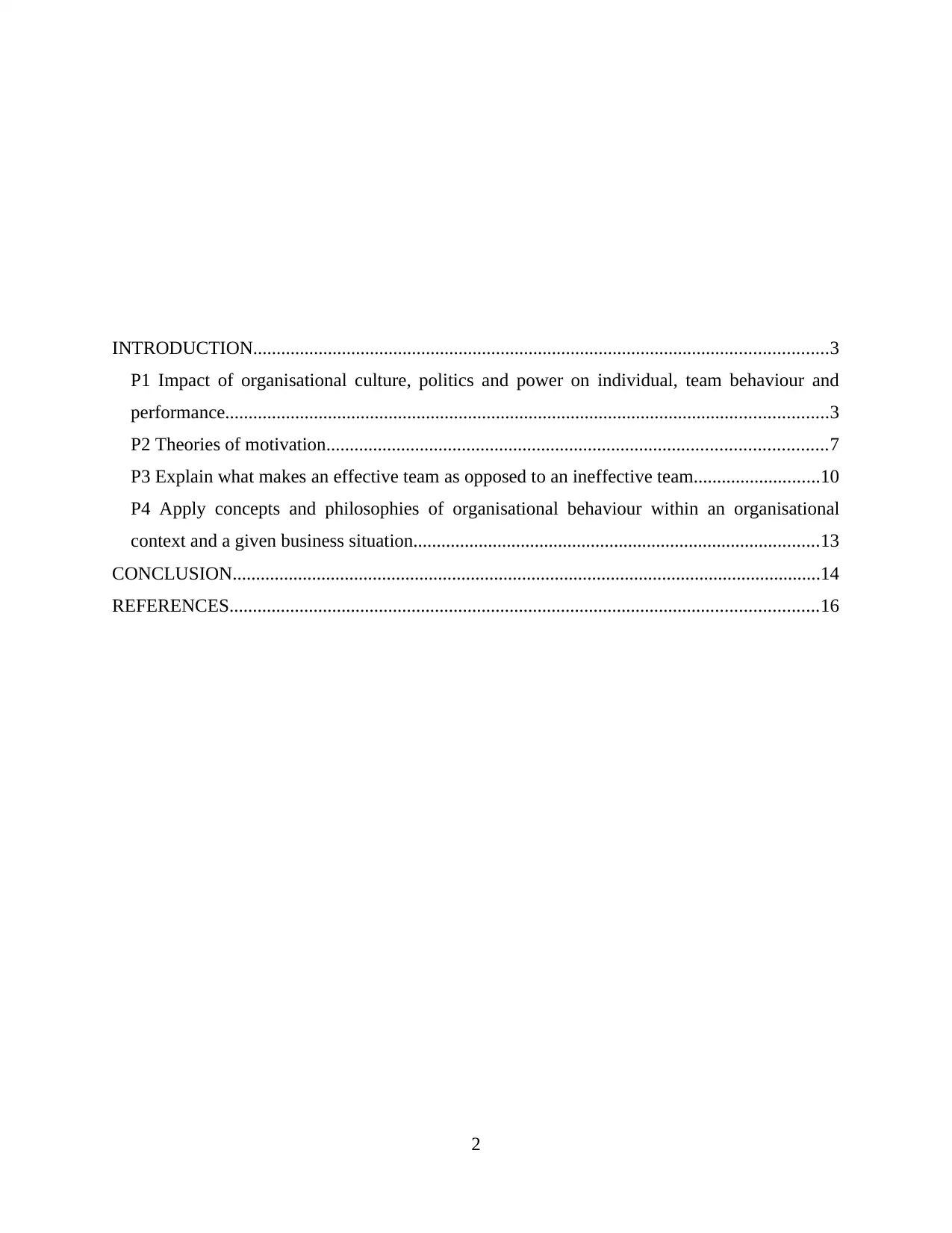
INTRODUCTION...........................................................................................................................3
P1 Impact of organisational culture, politics and power on individual, team behaviour and
performance.................................................................................................................................3
P2 Theories of motivation...........................................................................................................7
P3 Explain what makes an effective team as opposed to an ineffective team...........................10
P4 Apply concepts and philosophies of organisational behaviour within an organisational
context and a given business situation.......................................................................................13
CONCLUSION..............................................................................................................................14
REFERENCES..............................................................................................................................16
2
P1 Impact of organisational culture, politics and power on individual, team behaviour and
performance.................................................................................................................................3
P2 Theories of motivation...........................................................................................................7
P3 Explain what makes an effective team as opposed to an ineffective team...........................10
P4 Apply concepts and philosophies of organisational behaviour within an organisational
context and a given business situation.......................................................................................13
CONCLUSION..............................................................................................................................14
REFERENCES..............................................................................................................................16
2
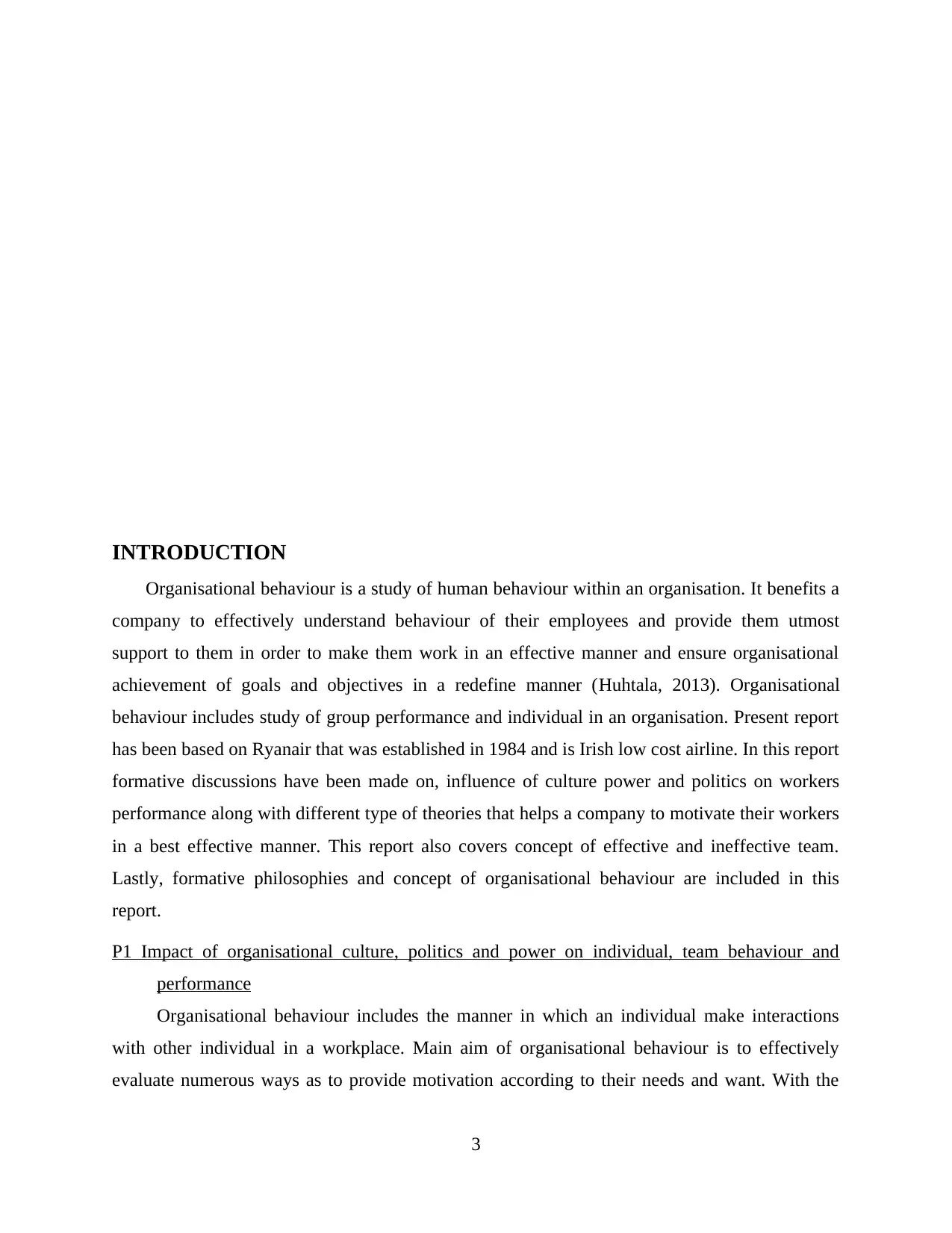
INTRODUCTION
Organisational behaviour is a study of human behaviour within an organisation. It benefits a
company to effectively understand behaviour of their employees and provide them utmost
support to them in order to make them work in an effective manner and ensure organisational
achievement of goals and objectives in a redefine manner (Huhtala, 2013). Organisational
behaviour includes study of group performance and individual in an organisation. Present report
has been based on Ryanair that was established in 1984 and is Irish low cost airline. In this report
formative discussions have been made on, influence of culture power and politics on workers
performance along with different type of theories that helps a company to motivate their workers
in a best effective manner. This report also covers concept of effective and ineffective team.
Lastly, formative philosophies and concept of organisational behaviour are included in this
report.
P1 Impact of organisational culture, politics and power on individual, team behaviour and
performance
Organisational behaviour includes the manner in which an individual make interactions
with other individual in a workplace. Main aim of organisational behaviour is to effectively
evaluate numerous ways as to provide motivation according to their needs and want. With the
3
Organisational behaviour is a study of human behaviour within an organisation. It benefits a
company to effectively understand behaviour of their employees and provide them utmost
support to them in order to make them work in an effective manner and ensure organisational
achievement of goals and objectives in a redefine manner (Huhtala, 2013). Organisational
behaviour includes study of group performance and individual in an organisation. Present report
has been based on Ryanair that was established in 1984 and is Irish low cost airline. In this report
formative discussions have been made on, influence of culture power and politics on workers
performance along with different type of theories that helps a company to motivate their workers
in a best effective manner. This report also covers concept of effective and ineffective team.
Lastly, formative philosophies and concept of organisational behaviour are included in this
report.
P1 Impact of organisational culture, politics and power on individual, team behaviour and
performance
Organisational behaviour includes the manner in which an individual make interactions
with other individual in a workplace. Main aim of organisational behaviour is to effectively
evaluate numerous ways as to provide motivation according to their needs and want. With the
3
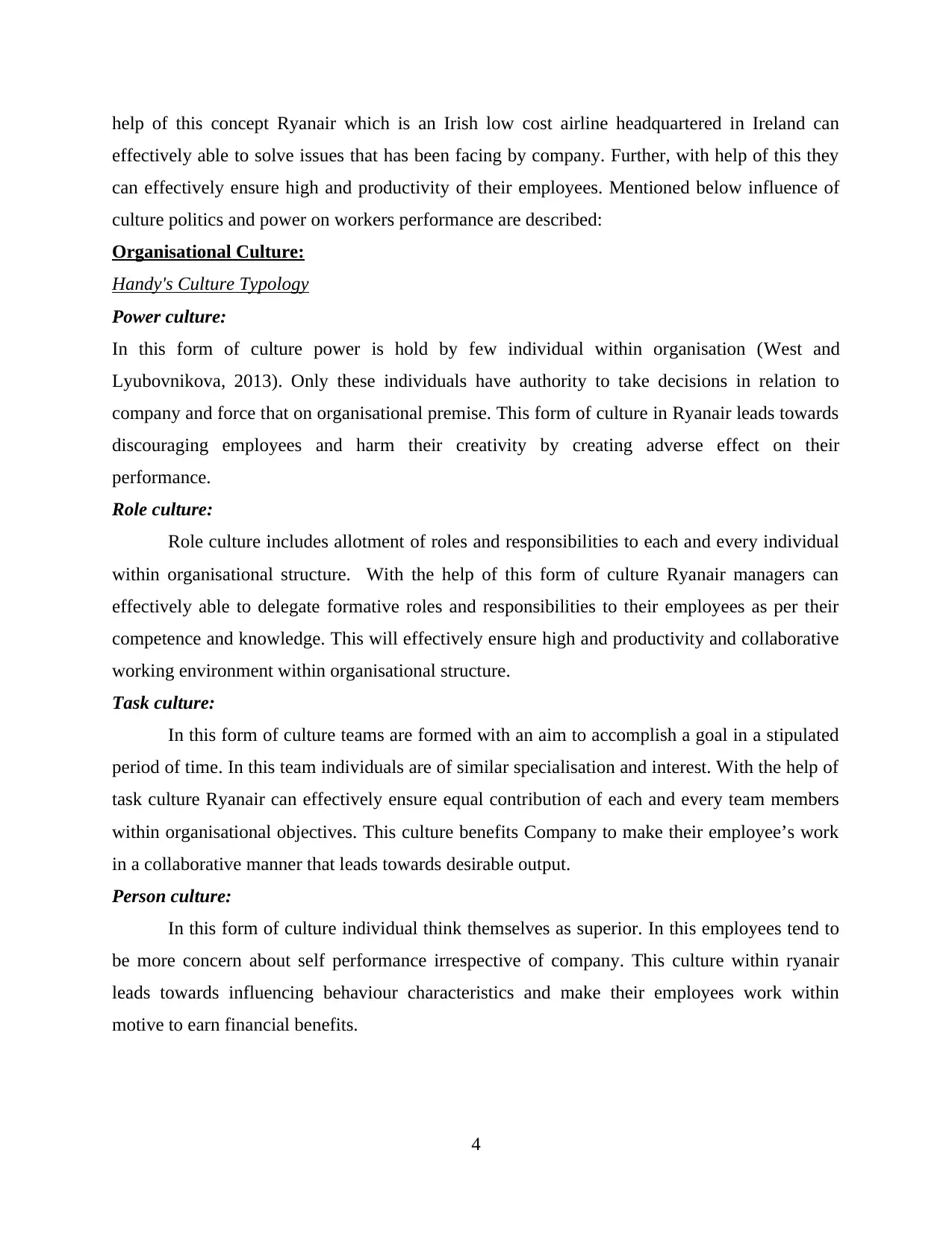
help of this concept Ryanair which is an Irish low cost airline headquartered in Ireland can
effectively able to solve issues that has been facing by company. Further, with help of this they
can effectively ensure high and productivity of their employees. Mentioned below influence of
culture politics and power on workers performance are described:
Organisational Culture:
Handy's Culture Typology
Power culture:
In this form of culture power is hold by few individual within organisation (West and
Lyubovnikova, 2013). Only these individuals have authority to take decisions in relation to
company and force that on organisational premise. This form of culture in Ryanair leads towards
discouraging employees and harm their creativity by creating adverse effect on their
performance.
Role culture:
Role culture includes allotment of roles and responsibilities to each and every individual
within organisational structure. With the help of this form of culture Ryanair managers can
effectively able to delegate formative roles and responsibilities to their employees as per their
competence and knowledge. This will effectively ensure high and productivity and collaborative
working environment within organisational structure.
Task culture:
In this form of culture teams are formed with an aim to accomplish a goal in a stipulated
period of time. In this team individuals are of similar specialisation and interest. With the help of
task culture Ryanair can effectively ensure equal contribution of each and every team members
within organisational objectives. This culture benefits Company to make their employee’s work
in a collaborative manner that leads towards desirable output.
Person culture:
In this form of culture individual think themselves as superior. In this employees tend to
be more concern about self performance irrespective of company. This culture within ryanair
leads towards influencing behaviour characteristics and make their employees work within
motive to earn financial benefits.
4
effectively able to solve issues that has been facing by company. Further, with help of this they
can effectively ensure high and productivity of their employees. Mentioned below influence of
culture politics and power on workers performance are described:
Organisational Culture:
Handy's Culture Typology
Power culture:
In this form of culture power is hold by few individual within organisation (West and
Lyubovnikova, 2013). Only these individuals have authority to take decisions in relation to
company and force that on organisational premise. This form of culture in Ryanair leads towards
discouraging employees and harm their creativity by creating adverse effect on their
performance.
Role culture:
Role culture includes allotment of roles and responsibilities to each and every individual
within organisational structure. With the help of this form of culture Ryanair managers can
effectively able to delegate formative roles and responsibilities to their employees as per their
competence and knowledge. This will effectively ensure high and productivity and collaborative
working environment within organisational structure.
Task culture:
In this form of culture teams are formed with an aim to accomplish a goal in a stipulated
period of time. In this team individuals are of similar specialisation and interest. With the help of
task culture Ryanair can effectively ensure equal contribution of each and every team members
within organisational objectives. This culture benefits Company to make their employee’s work
in a collaborative manner that leads towards desirable output.
Person culture:
In this form of culture individual think themselves as superior. In this employees tend to
be more concern about self performance irrespective of company. This culture within ryanair
leads towards influencing behaviour characteristics and make their employees work within
motive to earn financial benefits.
4
Secure Best Marks with AI Grader
Need help grading? Try our AI Grader for instant feedback on your assignments.
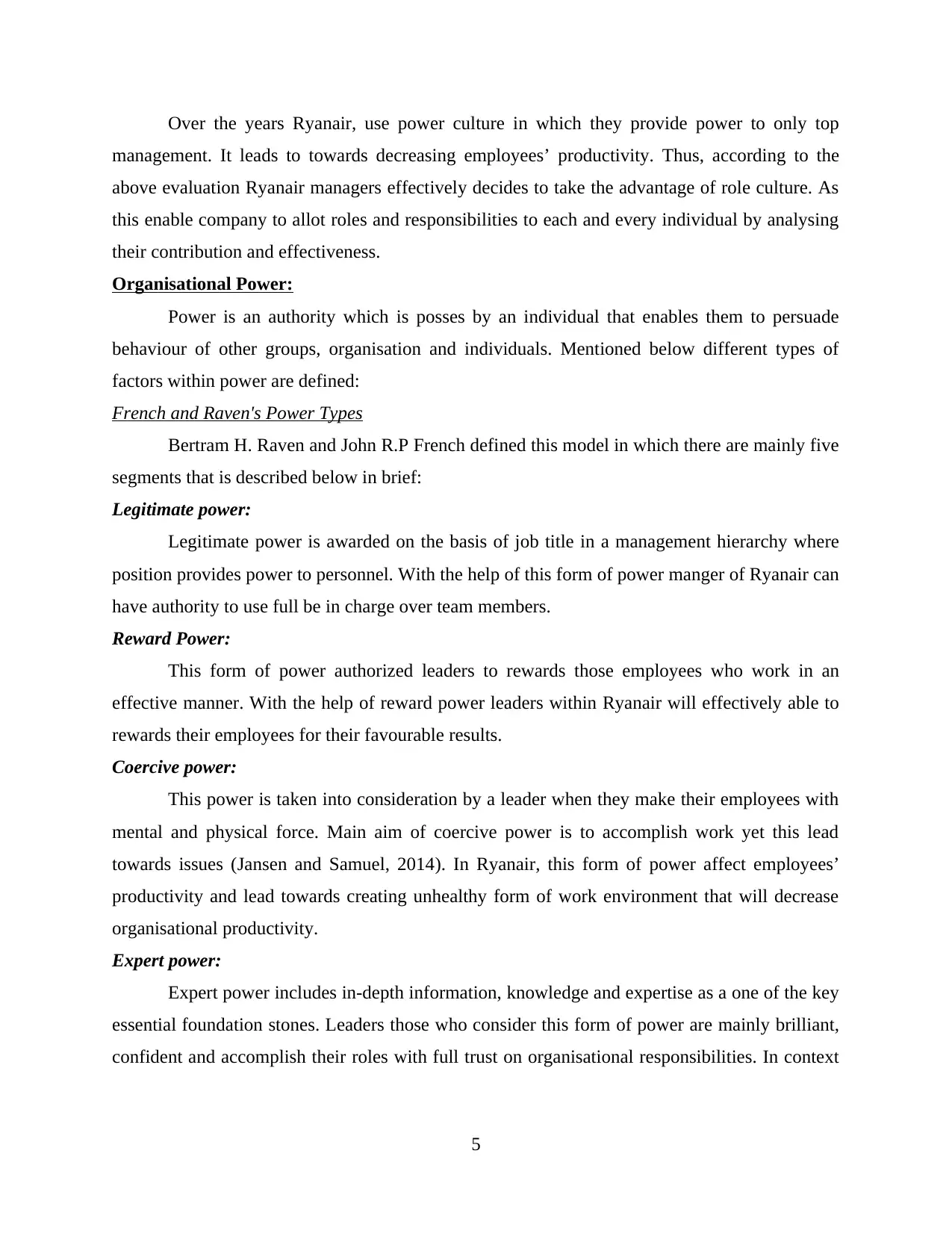
Over the years Ryanair, use power culture in which they provide power to only top
management. It leads to towards decreasing employees’ productivity. Thus, according to the
above evaluation Ryanair managers effectively decides to take the advantage of role culture. As
this enable company to allot roles and responsibilities to each and every individual by analysing
their contribution and effectiveness.
Organisational Power:
Power is an authority which is posses by an individual that enables them to persuade
behaviour of other groups, organisation and individuals. Mentioned below different types of
factors within power are defined:
French and Raven's Power Types
Bertram H. Raven and John R.P French defined this model in which there are mainly five
segments that is described below in brief:
Legitimate power:
Legitimate power is awarded on the basis of job title in a management hierarchy where
position provides power to personnel. With the help of this form of power manger of Ryanair can
have authority to use full be in charge over team members.
Reward Power:
This form of power authorized leaders to rewards those employees who work in an
effective manner. With the help of reward power leaders within Ryanair will effectively able to
rewards their employees for their favourable results.
Coercive power:
This power is taken into consideration by a leader when they make their employees with
mental and physical force. Main aim of coercive power is to accomplish work yet this lead
towards issues (Jansen and Samuel, 2014). In Ryanair, this form of power affect employees’
productivity and lead towards creating unhealthy form of work environment that will decrease
organisational productivity.
Expert power:
Expert power includes in-depth information, knowledge and expertise as a one of the key
essential foundation stones. Leaders those who consider this form of power are mainly brilliant,
confident and accomplish their roles with full trust on organisational responsibilities. In context
5
management. It leads to towards decreasing employees’ productivity. Thus, according to the
above evaluation Ryanair managers effectively decides to take the advantage of role culture. As
this enable company to allot roles and responsibilities to each and every individual by analysing
their contribution and effectiveness.
Organisational Power:
Power is an authority which is posses by an individual that enables them to persuade
behaviour of other groups, organisation and individuals. Mentioned below different types of
factors within power are defined:
French and Raven's Power Types
Bertram H. Raven and John R.P French defined this model in which there are mainly five
segments that is described below in brief:
Legitimate power:
Legitimate power is awarded on the basis of job title in a management hierarchy where
position provides power to personnel. With the help of this form of power manger of Ryanair can
have authority to use full be in charge over team members.
Reward Power:
This form of power authorized leaders to rewards those employees who work in an
effective manner. With the help of reward power leaders within Ryanair will effectively able to
rewards their employees for their favourable results.
Coercive power:
This power is taken into consideration by a leader when they make their employees with
mental and physical force. Main aim of coercive power is to accomplish work yet this lead
towards issues (Jansen and Samuel, 2014). In Ryanair, this form of power affect employees’
productivity and lead towards creating unhealthy form of work environment that will decrease
organisational productivity.
Expert power:
Expert power includes in-depth information, knowledge and expertise as a one of the key
essential foundation stones. Leaders those who consider this form of power are mainly brilliant,
confident and accomplish their roles with full trust on organisational responsibilities. In context
5
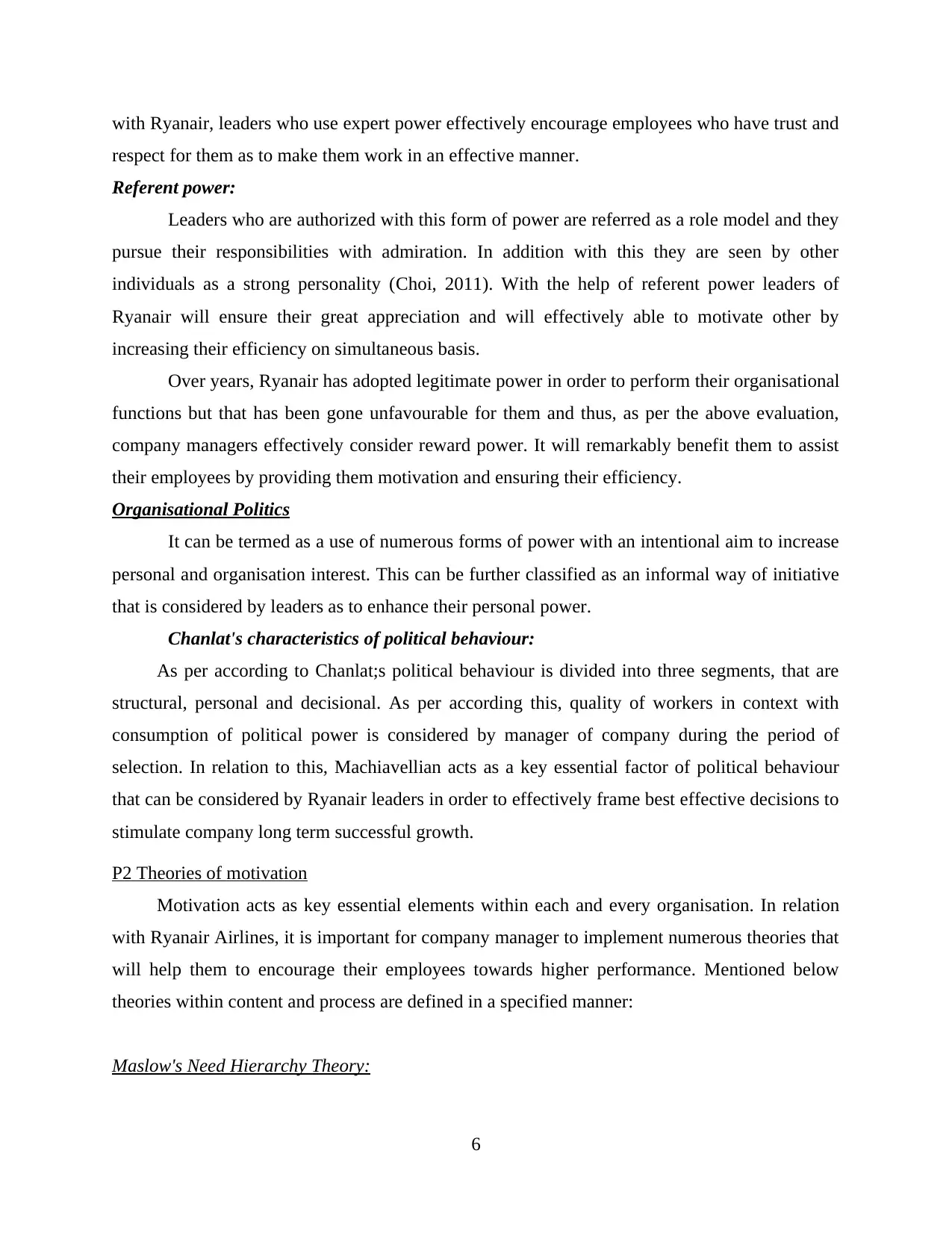
with Ryanair, leaders who use expert power effectively encourage employees who have trust and
respect for them as to make them work in an effective manner.
Referent power:
Leaders who are authorized with this form of power are referred as a role model and they
pursue their responsibilities with admiration. In addition with this they are seen by other
individuals as a strong personality (Choi, 2011). With the help of referent power leaders of
Ryanair will ensure their great appreciation and will effectively able to motivate other by
increasing their efficiency on simultaneous basis.
Over years, Ryanair has adopted legitimate power in order to perform their organisational
functions but that has been gone unfavourable for them and thus, as per the above evaluation,
company managers effectively consider reward power. It will remarkably benefit them to assist
their employees by providing them motivation and ensuring their efficiency.
Organisational Politics
It can be termed as a use of numerous forms of power with an intentional aim to increase
personal and organisation interest. This can be further classified as an informal way of initiative
that is considered by leaders as to enhance their personal power.
Chanlat's characteristics of political behaviour:
As per according to Chanlat;s political behaviour is divided into three segments, that are
structural, personal and decisional. As per according this, quality of workers in context with
consumption of political power is considered by manager of company during the period of
selection. In relation to this, Machiavellian acts as a key essential factor of political behaviour
that can be considered by Ryanair leaders in order to effectively frame best effective decisions to
stimulate company long term successful growth.
P2 Theories of motivation
Motivation acts as key essential elements within each and every organisation. In relation
with Ryanair Airlines, it is important for company manager to implement numerous theories that
will help them to encourage their employees towards higher performance. Mentioned below
theories within content and process are defined in a specified manner:
Maslow's Need Hierarchy Theory:
6
respect for them as to make them work in an effective manner.
Referent power:
Leaders who are authorized with this form of power are referred as a role model and they
pursue their responsibilities with admiration. In addition with this they are seen by other
individuals as a strong personality (Choi, 2011). With the help of referent power leaders of
Ryanair will ensure their great appreciation and will effectively able to motivate other by
increasing their efficiency on simultaneous basis.
Over years, Ryanair has adopted legitimate power in order to perform their organisational
functions but that has been gone unfavourable for them and thus, as per the above evaluation,
company managers effectively consider reward power. It will remarkably benefit them to assist
their employees by providing them motivation and ensuring their efficiency.
Organisational Politics
It can be termed as a use of numerous forms of power with an intentional aim to increase
personal and organisation interest. This can be further classified as an informal way of initiative
that is considered by leaders as to enhance their personal power.
Chanlat's characteristics of political behaviour:
As per according to Chanlat;s political behaviour is divided into three segments, that are
structural, personal and decisional. As per according this, quality of workers in context with
consumption of political power is considered by manager of company during the period of
selection. In relation to this, Machiavellian acts as a key essential factor of political behaviour
that can be considered by Ryanair leaders in order to effectively frame best effective decisions to
stimulate company long term successful growth.
P2 Theories of motivation
Motivation acts as key essential elements within each and every organisation. In relation
with Ryanair Airlines, it is important for company manager to implement numerous theories that
will help them to encourage their employees towards higher performance. Mentioned below
theories within content and process are defined in a specified manner:
Maslow's Need Hierarchy Theory:
6
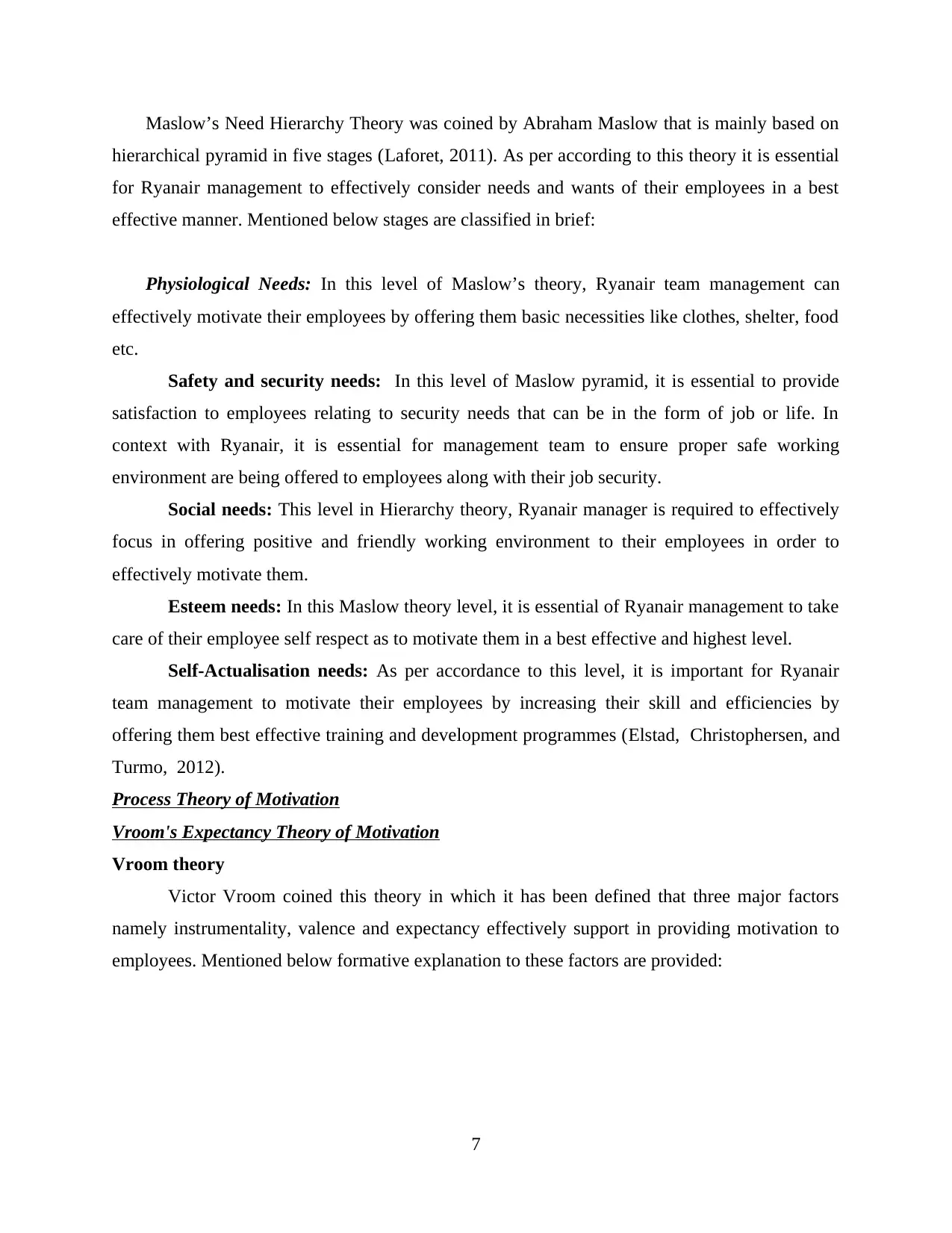
Maslow’s Need Hierarchy Theory was coined by Abraham Maslow that is mainly based on
hierarchical pyramid in five stages (Laforet, 2011). As per according to this theory it is essential
for Ryanair management to effectively consider needs and wants of their employees in a best
effective manner. Mentioned below stages are classified in brief:
Physiological Needs: In this level of Maslow’s theory, Ryanair team management can
effectively motivate their employees by offering them basic necessities like clothes, shelter, food
etc.
Safety and security needs: In this level of Maslow pyramid, it is essential to provide
satisfaction to employees relating to security needs that can be in the form of job or life. In
context with Ryanair, it is essential for management team to ensure proper safe working
environment are being offered to employees along with their job security.
Social needs: This level in Hierarchy theory, Ryanair manager is required to effectively
focus in offering positive and friendly working environment to their employees in order to
effectively motivate them.
Esteem needs: In this Maslow theory level, it is essential of Ryanair management to take
care of their employee self respect as to motivate them in a best effective and highest level.
Self-Actualisation needs: As per accordance to this level, it is important for Ryanair
team management to motivate their employees by increasing their skill and efficiencies by
offering them best effective training and development programmes (Elstad, Christophersen, and
Turmo, 2012).
Process Theory of Motivation
Vroom's Expectancy Theory of Motivation
Vroom theory
Victor Vroom coined this theory in which it has been defined that three major factors
namely instrumentality, valence and expectancy effectively support in providing motivation to
employees. Mentioned below formative explanation to these factors are provided:
7
hierarchical pyramid in five stages (Laforet, 2011). As per according to this theory it is essential
for Ryanair management to effectively consider needs and wants of their employees in a best
effective manner. Mentioned below stages are classified in brief:
Physiological Needs: In this level of Maslow’s theory, Ryanair team management can
effectively motivate their employees by offering them basic necessities like clothes, shelter, food
etc.
Safety and security needs: In this level of Maslow pyramid, it is essential to provide
satisfaction to employees relating to security needs that can be in the form of job or life. In
context with Ryanair, it is essential for management team to ensure proper safe working
environment are being offered to employees along with their job security.
Social needs: This level in Hierarchy theory, Ryanair manager is required to effectively
focus in offering positive and friendly working environment to their employees in order to
effectively motivate them.
Esteem needs: In this Maslow theory level, it is essential of Ryanair management to take
care of their employee self respect as to motivate them in a best effective and highest level.
Self-Actualisation needs: As per accordance to this level, it is important for Ryanair
team management to motivate their employees by increasing their skill and efficiencies by
offering them best effective training and development programmes (Elstad, Christophersen, and
Turmo, 2012).
Process Theory of Motivation
Vroom's Expectancy Theory of Motivation
Vroom theory
Victor Vroom coined this theory in which it has been defined that three major factors
namely instrumentality, valence and expectancy effectively support in providing motivation to
employees. Mentioned below formative explanation to these factors are provided:
7
Paraphrase This Document
Need a fresh take? Get an instant paraphrase of this document with our AI Paraphraser
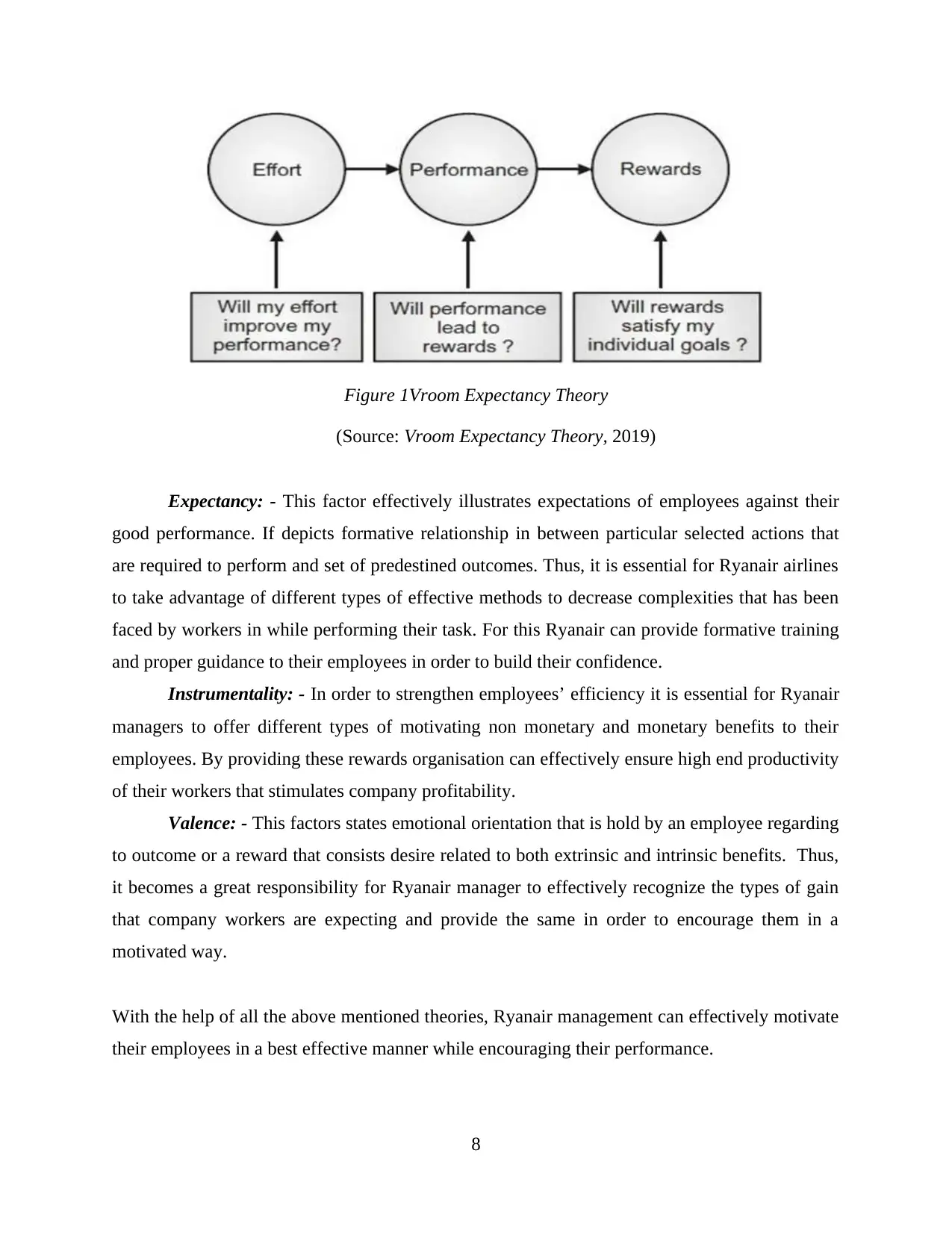
Figure 1Vroom Expectancy Theory
(Source: Vroom Expectancy Theory, 2019)
Expectancy: - This factor effectively illustrates expectations of employees against their
good performance. If depicts formative relationship in between particular selected actions that
are required to perform and set of predestined outcomes. Thus, it is essential for Ryanair airlines
to take advantage of different types of effective methods to decrease complexities that has been
faced by workers in while performing their task. For this Ryanair can provide formative training
and proper guidance to their employees in order to build their confidence.
Instrumentality: - In order to strengthen employees’ efficiency it is essential for Ryanair
managers to offer different types of motivating non monetary and monetary benefits to their
employees. By providing these rewards organisation can effectively ensure high end productivity
of their workers that stimulates company profitability.
Valence: - This factors states emotional orientation that is hold by an employee regarding
to outcome or a reward that consists desire related to both extrinsic and intrinsic benefits. Thus,
it becomes a great responsibility for Ryanair manager to effectively recognize the types of gain
that company workers are expecting and provide the same in order to encourage them in a
motivated way.
With the help of all the above mentioned theories, Ryanair management can effectively motivate
their employees in a best effective manner while encouraging their performance.
8
(Source: Vroom Expectancy Theory, 2019)
Expectancy: - This factor effectively illustrates expectations of employees against their
good performance. If depicts formative relationship in between particular selected actions that
are required to perform and set of predestined outcomes. Thus, it is essential for Ryanair airlines
to take advantage of different types of effective methods to decrease complexities that has been
faced by workers in while performing their task. For this Ryanair can provide formative training
and proper guidance to their employees in order to build their confidence.
Instrumentality: - In order to strengthen employees’ efficiency it is essential for Ryanair
managers to offer different types of motivating non monetary and monetary benefits to their
employees. By providing these rewards organisation can effectively ensure high end productivity
of their workers that stimulates company profitability.
Valence: - This factors states emotional orientation that is hold by an employee regarding
to outcome or a reward that consists desire related to both extrinsic and intrinsic benefits. Thus,
it becomes a great responsibility for Ryanair manager to effectively recognize the types of gain
that company workers are expecting and provide the same in order to encourage them in a
motivated way.
With the help of all the above mentioned theories, Ryanair management can effectively motivate
their employees in a best effective manner while encouraging their performance.
8

P3 Explain what makes an effective team as opposed to an ineffective team
In order to accomplish work in a best effective manner it is essential for each and every
organisation to consider effectiveness of effective team. A team is a formative group of skilled
and potential members those who perform their roles in a coordinating manner with a common
aim to accomplish organisational goals in a best effective manner. There are mainly two types of
team namely, effective and ineffective team (Demir, 2011). It has been evaluated that effective
team lead towards best effective outcome while on the other hand, ineffective team generates
negative team.
Effective Team:
Effective Team is a combination of those individuals who works in a collaborative
manner with a formative aim to accomplish organisational goals in a best effective way.
Ineffective Team:
The work conducted by ineffective team mainly lead towards negative outcomes for
organisation. This builds demotivation in between team members which automatically decreases
their level of performance and productivity.
Differences between effective and ineffective team
Basis Effective Team Ineffective Team
Interdependence
Effective team have
interdependency of work that
ensures comprehensibility within
work by each and each individuals
in best effective positive way.
In this form of team individuals does
not perform their roles in a
coordinating and cooperating manner.
This is because lack of trust prevailed
within team that lead towards
negative outcomes.
Goals
Effective team have effective set of
clear and specified objectives which
benefits each and every team
members to emphasize on
organisation goal. This lead towards
accomplishment of goals in accurate
Ineffective have deficiency of clear
goal which creates de motivation
among team members and restrain
them for accomplish their goals
within in a desirable manner and in
accurate time frame.
9
In order to accomplish work in a best effective manner it is essential for each and every
organisation to consider effectiveness of effective team. A team is a formative group of skilled
and potential members those who perform their roles in a coordinating manner with a common
aim to accomplish organisational goals in a best effective manner. There are mainly two types of
team namely, effective and ineffective team (Demir, 2011). It has been evaluated that effective
team lead towards best effective outcome while on the other hand, ineffective team generates
negative team.
Effective Team:
Effective Team is a combination of those individuals who works in a collaborative
manner with a formative aim to accomplish organisational goals in a best effective way.
Ineffective Team:
The work conducted by ineffective team mainly lead towards negative outcomes for
organisation. This builds demotivation in between team members which automatically decreases
their level of performance and productivity.
Differences between effective and ineffective team
Basis Effective Team Ineffective Team
Interdependence
Effective team have
interdependency of work that
ensures comprehensibility within
work by each and each individuals
in best effective positive way.
In this form of team individuals does
not perform their roles in a
coordinating and cooperating manner.
This is because lack of trust prevailed
within team that lead towards
negative outcomes.
Goals
Effective team have effective set of
clear and specified objectives which
benefits each and every team
members to emphasize on
organisation goal. This lead towards
accomplishment of goals in accurate
Ineffective have deficiency of clear
goal which creates de motivation
among team members and restrain
them for accomplish their goals
within in a desirable manner and in
accurate time frame.
9
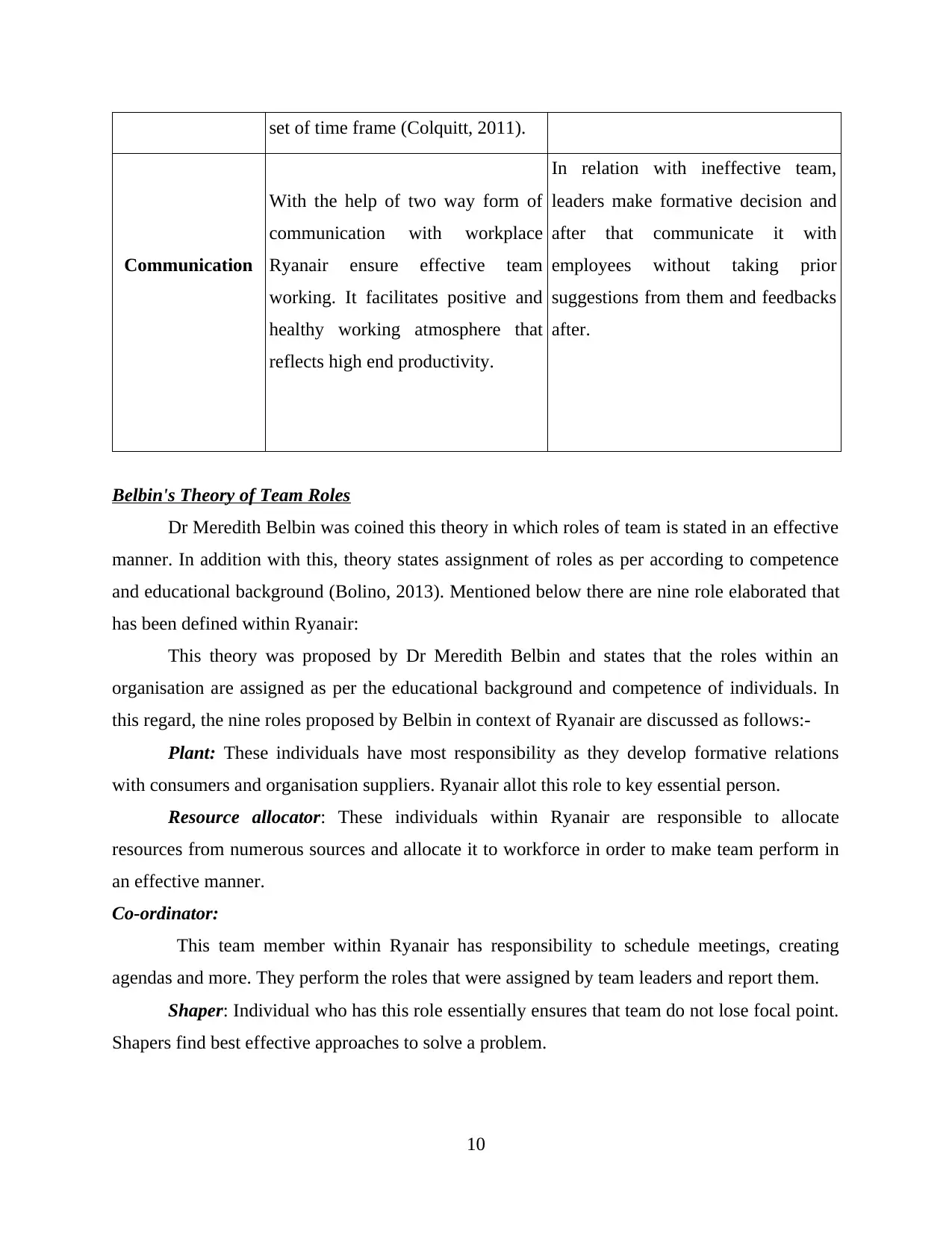
set of time frame (Colquitt, 2011).
Communication
With the help of two way form of
communication with workplace
Ryanair ensure effective team
working. It facilitates positive and
healthy working atmosphere that
reflects high end productivity.
In relation with ineffective team,
leaders make formative decision and
after that communicate it with
employees without taking prior
suggestions from them and feedbacks
after.
Belbin's Theory of Team Roles
Dr Meredith Belbin was coined this theory in which roles of team is stated in an effective
manner. In addition with this, theory states assignment of roles as per according to competence
and educational background (Bolino, 2013). Mentioned below there are nine role elaborated that
has been defined within Ryanair:
This theory was proposed by Dr Meredith Belbin and states that the roles within an
organisation are assigned as per the educational background and competence of individuals. In
this regard, the nine roles proposed by Belbin in context of Ryanair are discussed as follows:-
Plant: These individuals have most responsibility as they develop formative relations
with consumers and organisation suppliers. Ryanair allot this role to key essential person.
Resource allocator: These individuals within Ryanair are responsible to allocate
resources from numerous sources and allocate it to workforce in order to make team perform in
an effective manner.
Co-ordinator:
This team member within Ryanair has responsibility to schedule meetings, creating
agendas and more. They perform the roles that were assigned by team leaders and report them.
Shaper: Individual who has this role essentially ensures that team do not lose focal point.
Shapers find best effective approaches to solve a problem.
10
Communication
With the help of two way form of
communication with workplace
Ryanair ensure effective team
working. It facilitates positive and
healthy working atmosphere that
reflects high end productivity.
In relation with ineffective team,
leaders make formative decision and
after that communicate it with
employees without taking prior
suggestions from them and feedbacks
after.
Belbin's Theory of Team Roles
Dr Meredith Belbin was coined this theory in which roles of team is stated in an effective
manner. In addition with this, theory states assignment of roles as per according to competence
and educational background (Bolino, 2013). Mentioned below there are nine role elaborated that
has been defined within Ryanair:
This theory was proposed by Dr Meredith Belbin and states that the roles within an
organisation are assigned as per the educational background and competence of individuals. In
this regard, the nine roles proposed by Belbin in context of Ryanair are discussed as follows:-
Plant: These individuals have most responsibility as they develop formative relations
with consumers and organisation suppliers. Ryanair allot this role to key essential person.
Resource allocator: These individuals within Ryanair are responsible to allocate
resources from numerous sources and allocate it to workforce in order to make team perform in
an effective manner.
Co-ordinator:
This team member within Ryanair has responsibility to schedule meetings, creating
agendas and more. They perform the roles that were assigned by team leaders and report them.
Shaper: Individual who has this role essentially ensures that team do not lose focal point.
Shapers find best effective approaches to solve a problem.
10
Secure Best Marks with AI Grader
Need help grading? Try our AI Grader for instant feedback on your assignments.
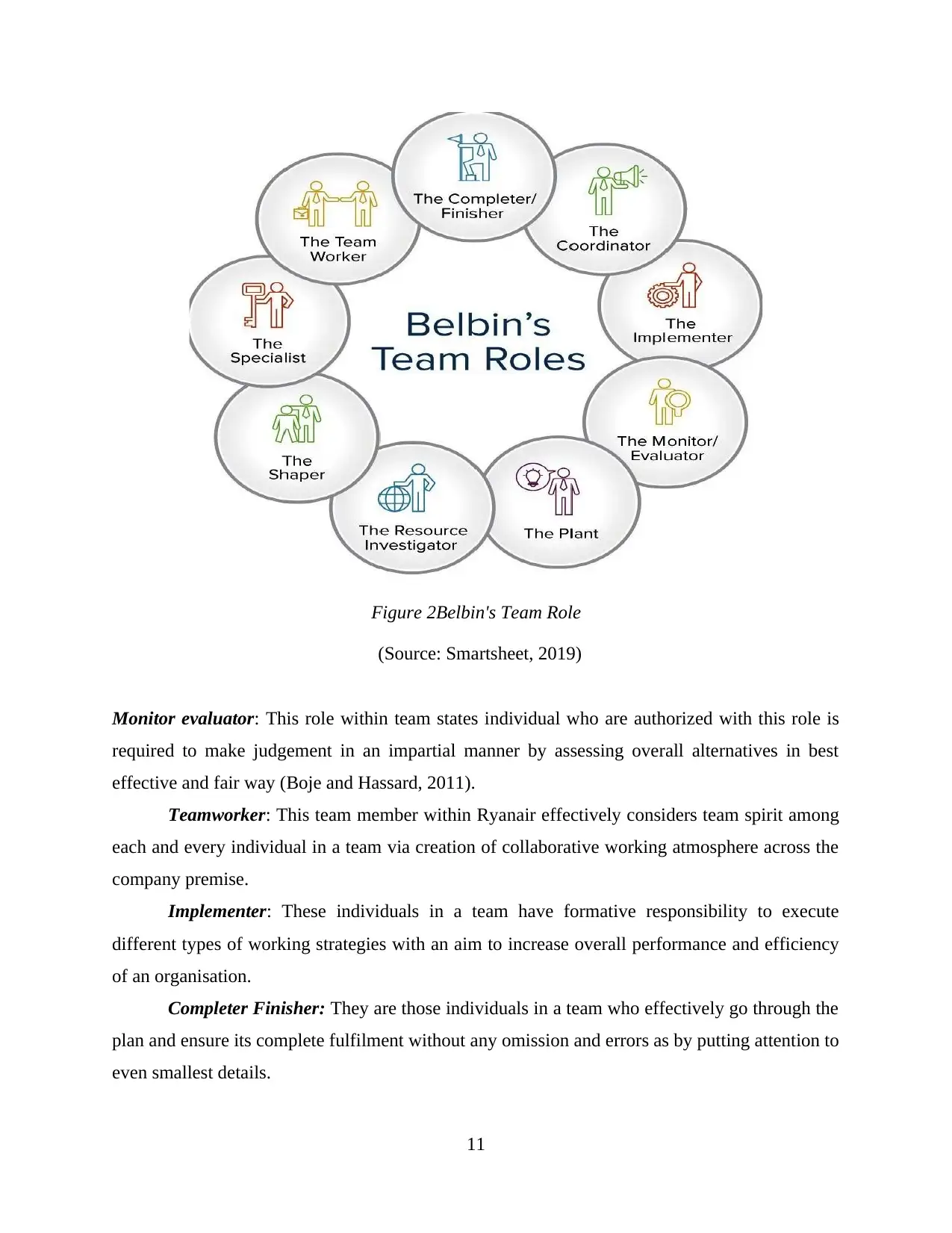
Figure 2Belbin's Team Role
(Source: Smartsheet, 2019)
Monitor evaluator: This role within team states individual who are authorized with this role is
required to make judgement in an impartial manner by assessing overall alternatives in best
effective and fair way (Boje and Hassard, 2011).
Teamworker: This team member within Ryanair effectively considers team spirit among
each and every individual in a team via creation of collaborative working atmosphere across the
company premise.
Implementer: These individuals in a team have formative responsibility to execute
different types of working strategies with an aim to increase overall performance and efficiency
of an organisation.
Completer Finisher: They are those individuals in a team who effectively go through the
plan and ensure its complete fulfilment without any omission and errors as by putting attention to
even smallest details.
11
(Source: Smartsheet, 2019)
Monitor evaluator: This role within team states individual who are authorized with this role is
required to make judgement in an impartial manner by assessing overall alternatives in best
effective and fair way (Boje and Hassard, 2011).
Teamworker: This team member within Ryanair effectively considers team spirit among
each and every individual in a team via creation of collaborative working atmosphere across the
company premise.
Implementer: These individuals in a team have formative responsibility to execute
different types of working strategies with an aim to increase overall performance and efficiency
of an organisation.
Completer Finisher: They are those individuals in a team who effectively go through the
plan and ensure its complete fulfilment without any omission and errors as by putting attention to
even smallest details.
11
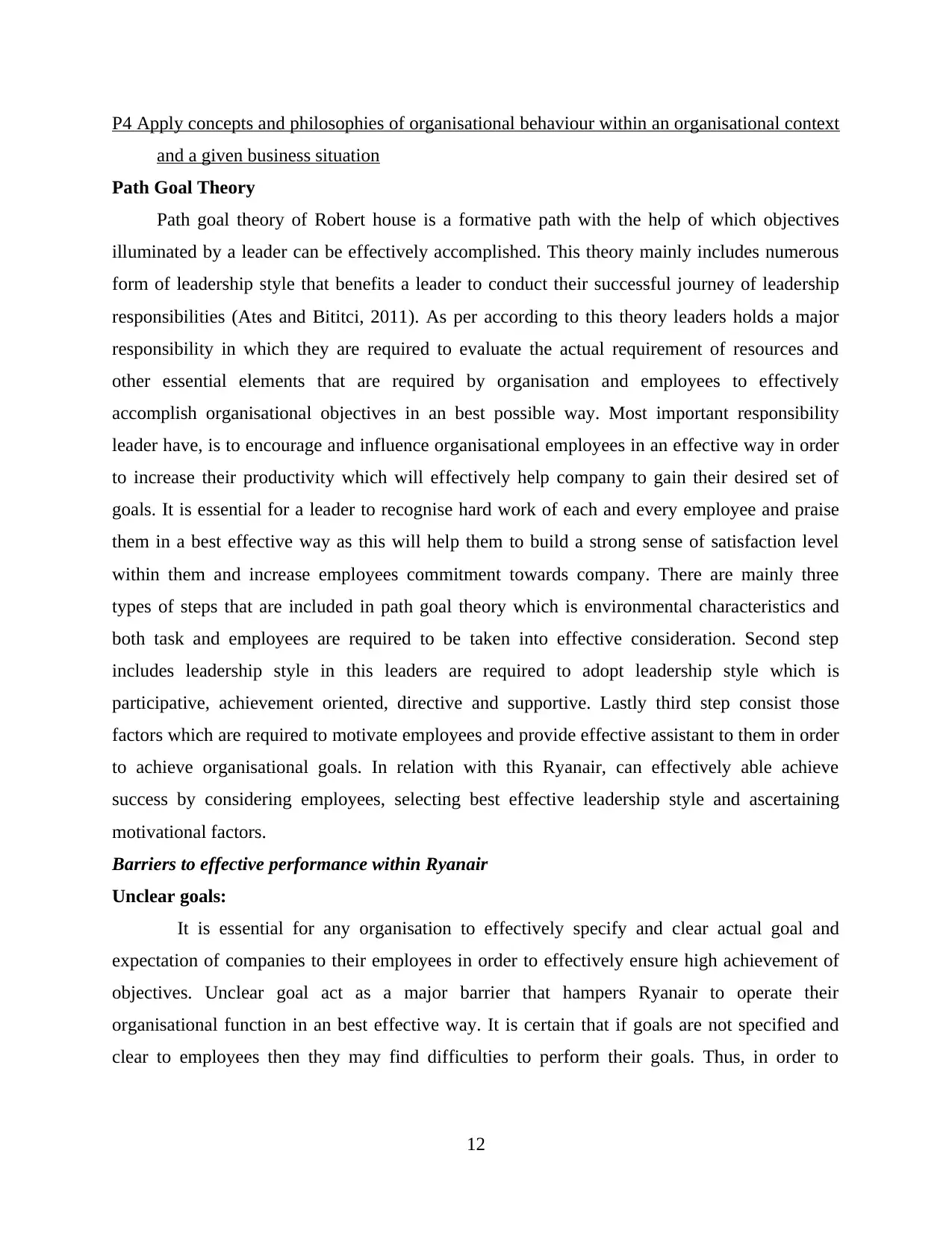
P4 Apply concepts and philosophies of organisational behaviour within an organisational context
and a given business situation
Path Goal Theory
Path goal theory of Robert house is a formative path with the help of which objectives
illuminated by a leader can be effectively accomplished. This theory mainly includes numerous
form of leadership style that benefits a leader to conduct their successful journey of leadership
responsibilities (Ates and Bititci, 2011). As per according to this theory leaders holds a major
responsibility in which they are required to evaluate the actual requirement of resources and
other essential elements that are required by organisation and employees to effectively
accomplish organisational objectives in an best possible way. Most important responsibility
leader have, is to encourage and influence organisational employees in an effective way in order
to increase their productivity which will effectively help company to gain their desired set of
goals. It is essential for a leader to recognise hard work of each and every employee and praise
them in a best effective way as this will help them to build a strong sense of satisfaction level
within them and increase employees commitment towards company. There are mainly three
types of steps that are included in path goal theory which is environmental characteristics and
both task and employees are required to be taken into effective consideration. Second step
includes leadership style in this leaders are required to adopt leadership style which is
participative, achievement oriented, directive and supportive. Lastly third step consist those
factors which are required to motivate employees and provide effective assistant to them in order
to achieve organisational goals. In relation with this Ryanair, can effectively able achieve
success by considering employees, selecting best effective leadership style and ascertaining
motivational factors.
Barriers to effective performance within Ryanair
Unclear goals:
It is essential for any organisation to effectively specify and clear actual goal and
expectation of companies to their employees in order to effectively ensure high achievement of
objectives. Unclear goal act as a major barrier that hampers Ryanair to operate their
organisational function in an best effective way. It is certain that if goals are not specified and
clear to employees then they may find difficulties to perform their goals. Thus, in order to
12
and a given business situation
Path Goal Theory
Path goal theory of Robert house is a formative path with the help of which objectives
illuminated by a leader can be effectively accomplished. This theory mainly includes numerous
form of leadership style that benefits a leader to conduct their successful journey of leadership
responsibilities (Ates and Bititci, 2011). As per according to this theory leaders holds a major
responsibility in which they are required to evaluate the actual requirement of resources and
other essential elements that are required by organisation and employees to effectively
accomplish organisational objectives in an best possible way. Most important responsibility
leader have, is to encourage and influence organisational employees in an effective way in order
to increase their productivity which will effectively help company to gain their desired set of
goals. It is essential for a leader to recognise hard work of each and every employee and praise
them in a best effective way as this will help them to build a strong sense of satisfaction level
within them and increase employees commitment towards company. There are mainly three
types of steps that are included in path goal theory which is environmental characteristics and
both task and employees are required to be taken into effective consideration. Second step
includes leadership style in this leaders are required to adopt leadership style which is
participative, achievement oriented, directive and supportive. Lastly third step consist those
factors which are required to motivate employees and provide effective assistant to them in order
to achieve organisational goals. In relation with this Ryanair, can effectively able achieve
success by considering employees, selecting best effective leadership style and ascertaining
motivational factors.
Barriers to effective performance within Ryanair
Unclear goals:
It is essential for any organisation to effectively specify and clear actual goal and
expectation of companies to their employees in order to effectively ensure high achievement of
objectives. Unclear goal act as a major barrier that hampers Ryanair to operate their
organisational function in an best effective way. It is certain that if goals are not specified and
clear to employees then they may find difficulties to perform their goals. Thus, in order to
12
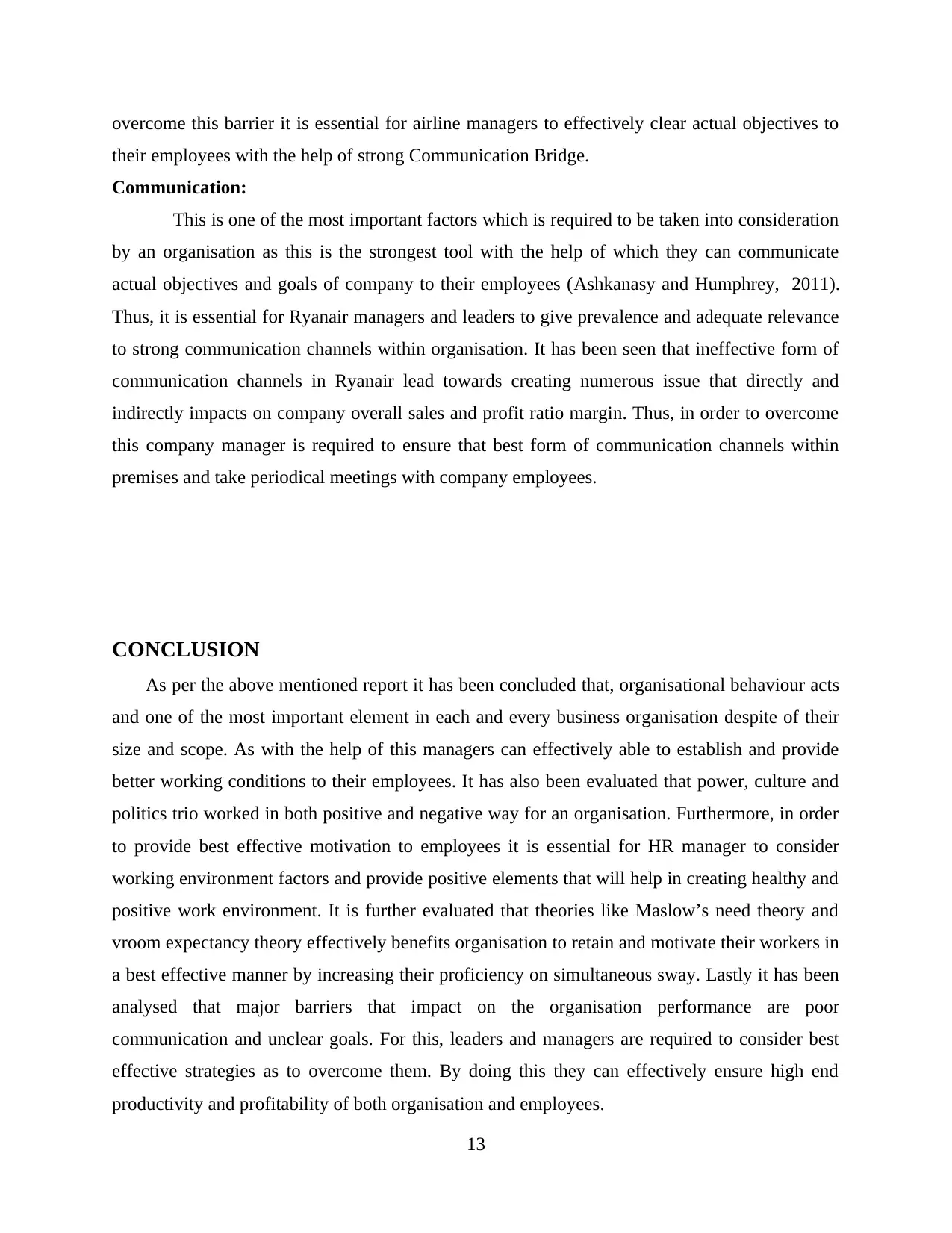
overcome this barrier it is essential for airline managers to effectively clear actual objectives to
their employees with the help of strong Communication Bridge.
Communication:
This is one of the most important factors which is required to be taken into consideration
by an organisation as this is the strongest tool with the help of which they can communicate
actual objectives and goals of company to their employees (Ashkanasy and Humphrey, 2011).
Thus, it is essential for Ryanair managers and leaders to give prevalence and adequate relevance
to strong communication channels within organisation. It has been seen that ineffective form of
communication channels in Ryanair lead towards creating numerous issue that directly and
indirectly impacts on company overall sales and profit ratio margin. Thus, in order to overcome
this company manager is required to ensure that best form of communication channels within
premises and take periodical meetings with company employees.
CONCLUSION
As per the above mentioned report it has been concluded that, organisational behaviour acts
and one of the most important element in each and every business organisation despite of their
size and scope. As with the help of this managers can effectively able to establish and provide
better working conditions to their employees. It has also been evaluated that power, culture and
politics trio worked in both positive and negative way for an organisation. Furthermore, in order
to provide best effective motivation to employees it is essential for HR manager to consider
working environment factors and provide positive elements that will help in creating healthy and
positive work environment. It is further evaluated that theories like Maslow’s need theory and
vroom expectancy theory effectively benefits organisation to retain and motivate their workers in
a best effective manner by increasing their proficiency on simultaneous sway. Lastly it has been
analysed that major barriers that impact on the organisation performance are poor
communication and unclear goals. For this, leaders and managers are required to consider best
effective strategies as to overcome them. By doing this they can effectively ensure high end
productivity and profitability of both organisation and employees.
13
their employees with the help of strong Communication Bridge.
Communication:
This is one of the most important factors which is required to be taken into consideration
by an organisation as this is the strongest tool with the help of which they can communicate
actual objectives and goals of company to their employees (Ashkanasy and Humphrey, 2011).
Thus, it is essential for Ryanair managers and leaders to give prevalence and adequate relevance
to strong communication channels within organisation. It has been seen that ineffective form of
communication channels in Ryanair lead towards creating numerous issue that directly and
indirectly impacts on company overall sales and profit ratio margin. Thus, in order to overcome
this company manager is required to ensure that best form of communication channels within
premises and take periodical meetings with company employees.
CONCLUSION
As per the above mentioned report it has been concluded that, organisational behaviour acts
and one of the most important element in each and every business organisation despite of their
size and scope. As with the help of this managers can effectively able to establish and provide
better working conditions to their employees. It has also been evaluated that power, culture and
politics trio worked in both positive and negative way for an organisation. Furthermore, in order
to provide best effective motivation to employees it is essential for HR manager to consider
working environment factors and provide positive elements that will help in creating healthy and
positive work environment. It is further evaluated that theories like Maslow’s need theory and
vroom expectancy theory effectively benefits organisation to retain and motivate their workers in
a best effective manner by increasing their proficiency on simultaneous sway. Lastly it has been
analysed that major barriers that impact on the organisation performance are poor
communication and unclear goals. For this, leaders and managers are required to consider best
effective strategies as to overcome them. By doing this they can effectively ensure high end
productivity and profitability of both organisation and employees.
13
Paraphrase This Document
Need a fresh take? Get an instant paraphrase of this document with our AI Paraphraser

14
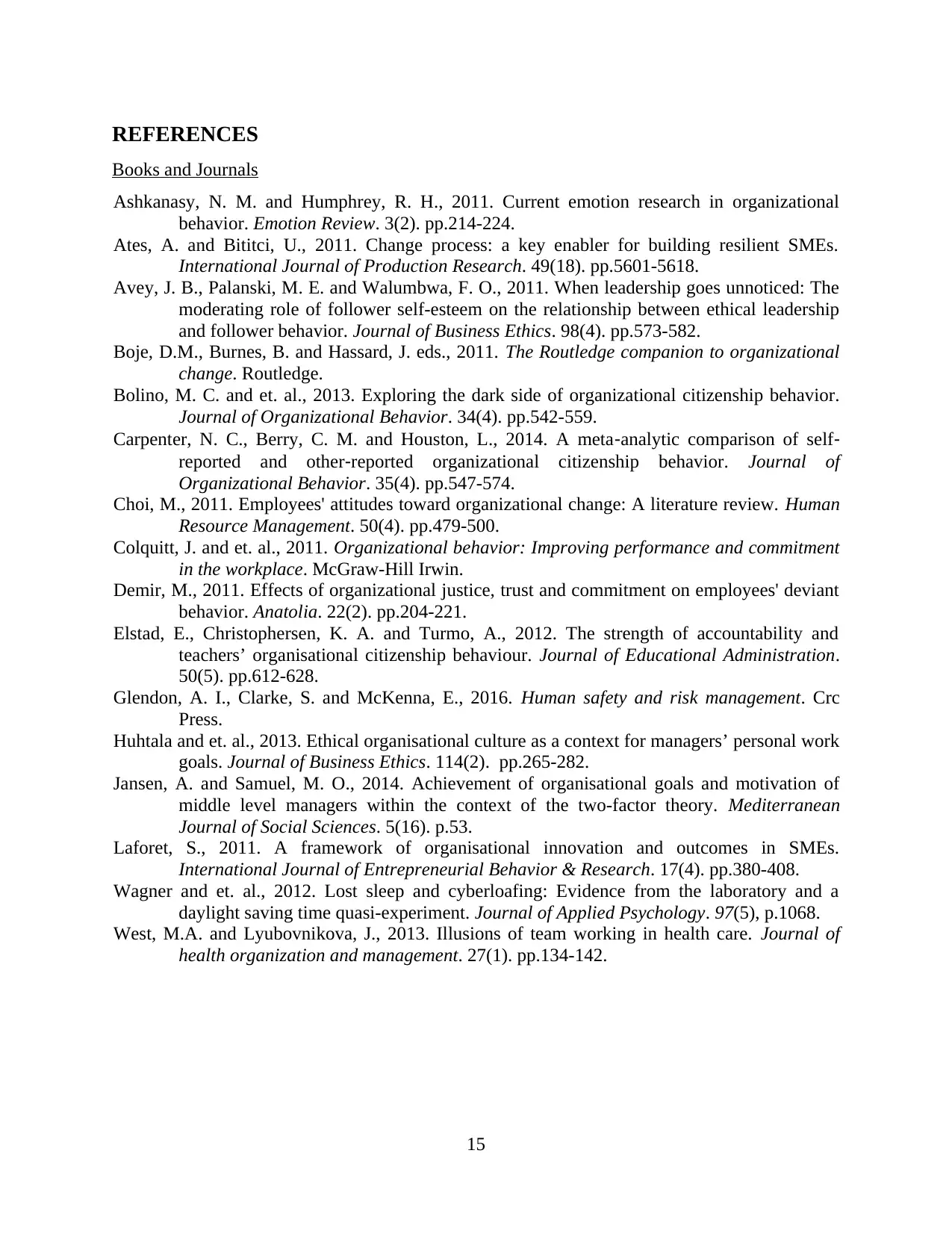
REFERENCES
Books and Journals
Ashkanasy, N. M. and Humphrey, R. H., 2011. Current emotion research in organizational
behavior. Emotion Review. 3(2). pp.214-224.
Ates, A. and Bititci, U., 2011. Change process: a key enabler for building resilient SMEs.
International Journal of Production Research. 49(18). pp.5601-5618.
Avey, J. B., Palanski, M. E. and Walumbwa, F. O., 2011. When leadership goes unnoticed: The
moderating role of follower self-esteem on the relationship between ethical leadership
and follower behavior. Journal of Business Ethics. 98(4). pp.573-582.
Boje, D.M., Burnes, B. and Hassard, J. eds., 2011. The Routledge companion to organizational
change. Routledge.
Bolino, M. C. and et. al., 2013. Exploring the dark side of organizational citizenship behavior.
Journal of Organizational Behavior. 34(4). pp.542-559.
Carpenter, N. C., Berry, C. M. and Houston, L., 2014. A meta‐analytic comparison of self‐
reported and other‐reported organizational citizenship behavior. Journal of
Organizational Behavior. 35(4). pp.547-574.
Choi, M., 2011. Employees' attitudes toward organizational change: A literature review. Human
Resource Management. 50(4). pp.479-500.
Colquitt, J. and et. al., 2011. Organizational behavior: Improving performance and commitment
in the workplace. McGraw-Hill Irwin.
Demir, M., 2011. Effects of organizational justice, trust and commitment on employees' deviant
behavior. Anatolia. 22(2). pp.204-221.
Elstad, E., Christophersen, K. A. and Turmo, A., 2012. The strength of accountability and
teachers’ organisational citizenship behaviour. Journal of Educational Administration.
50(5). pp.612-628.
Glendon, A. I., Clarke, S. and McKenna, E., 2016. Human safety and risk management. Crc
Press.
Huhtala and et. al., 2013. Ethical organisational culture as a context for managers’ personal work
goals. Journal of Business Ethics. 114(2). pp.265-282.
Jansen, A. and Samuel, M. O., 2014. Achievement of organisational goals and motivation of
middle level managers within the context of the two-factor theory. Mediterranean
Journal of Social Sciences. 5(16). p.53.
Laforet, S., 2011. A framework of organisational innovation and outcomes in SMEs.
International Journal of Entrepreneurial Behavior & Research. 17(4). pp.380-408.
Wagner and et. al., 2012. Lost sleep and cyberloafing: Evidence from the laboratory and a
daylight saving time quasi-experiment. Journal of Applied Psychology. 97(5), p.1068.
West, M.A. and Lyubovnikova, J., 2013. Illusions of team working in health care. Journal of
health organization and management. 27(1). pp.134-142.
15
Books and Journals
Ashkanasy, N. M. and Humphrey, R. H., 2011. Current emotion research in organizational
behavior. Emotion Review. 3(2). pp.214-224.
Ates, A. and Bititci, U., 2011. Change process: a key enabler for building resilient SMEs.
International Journal of Production Research. 49(18). pp.5601-5618.
Avey, J. B., Palanski, M. E. and Walumbwa, F. O., 2011. When leadership goes unnoticed: The
moderating role of follower self-esteem on the relationship between ethical leadership
and follower behavior. Journal of Business Ethics. 98(4). pp.573-582.
Boje, D.M., Burnes, B. and Hassard, J. eds., 2011. The Routledge companion to organizational
change. Routledge.
Bolino, M. C. and et. al., 2013. Exploring the dark side of organizational citizenship behavior.
Journal of Organizational Behavior. 34(4). pp.542-559.
Carpenter, N. C., Berry, C. M. and Houston, L., 2014. A meta‐analytic comparison of self‐
reported and other‐reported organizational citizenship behavior. Journal of
Organizational Behavior. 35(4). pp.547-574.
Choi, M., 2011. Employees' attitudes toward organizational change: A literature review. Human
Resource Management. 50(4). pp.479-500.
Colquitt, J. and et. al., 2011. Organizational behavior: Improving performance and commitment
in the workplace. McGraw-Hill Irwin.
Demir, M., 2011. Effects of organizational justice, trust and commitment on employees' deviant
behavior. Anatolia. 22(2). pp.204-221.
Elstad, E., Christophersen, K. A. and Turmo, A., 2012. The strength of accountability and
teachers’ organisational citizenship behaviour. Journal of Educational Administration.
50(5). pp.612-628.
Glendon, A. I., Clarke, S. and McKenna, E., 2016. Human safety and risk management. Crc
Press.
Huhtala and et. al., 2013. Ethical organisational culture as a context for managers’ personal work
goals. Journal of Business Ethics. 114(2). pp.265-282.
Jansen, A. and Samuel, M. O., 2014. Achievement of organisational goals and motivation of
middle level managers within the context of the two-factor theory. Mediterranean
Journal of Social Sciences. 5(16). p.53.
Laforet, S., 2011. A framework of organisational innovation and outcomes in SMEs.
International Journal of Entrepreneurial Behavior & Research. 17(4). pp.380-408.
Wagner and et. al., 2012. Lost sleep and cyberloafing: Evidence from the laboratory and a
daylight saving time quasi-experiment. Journal of Applied Psychology. 97(5), p.1068.
West, M.A. and Lyubovnikova, J., 2013. Illusions of team working in health care. Journal of
health organization and management. 27(1). pp.134-142.
15
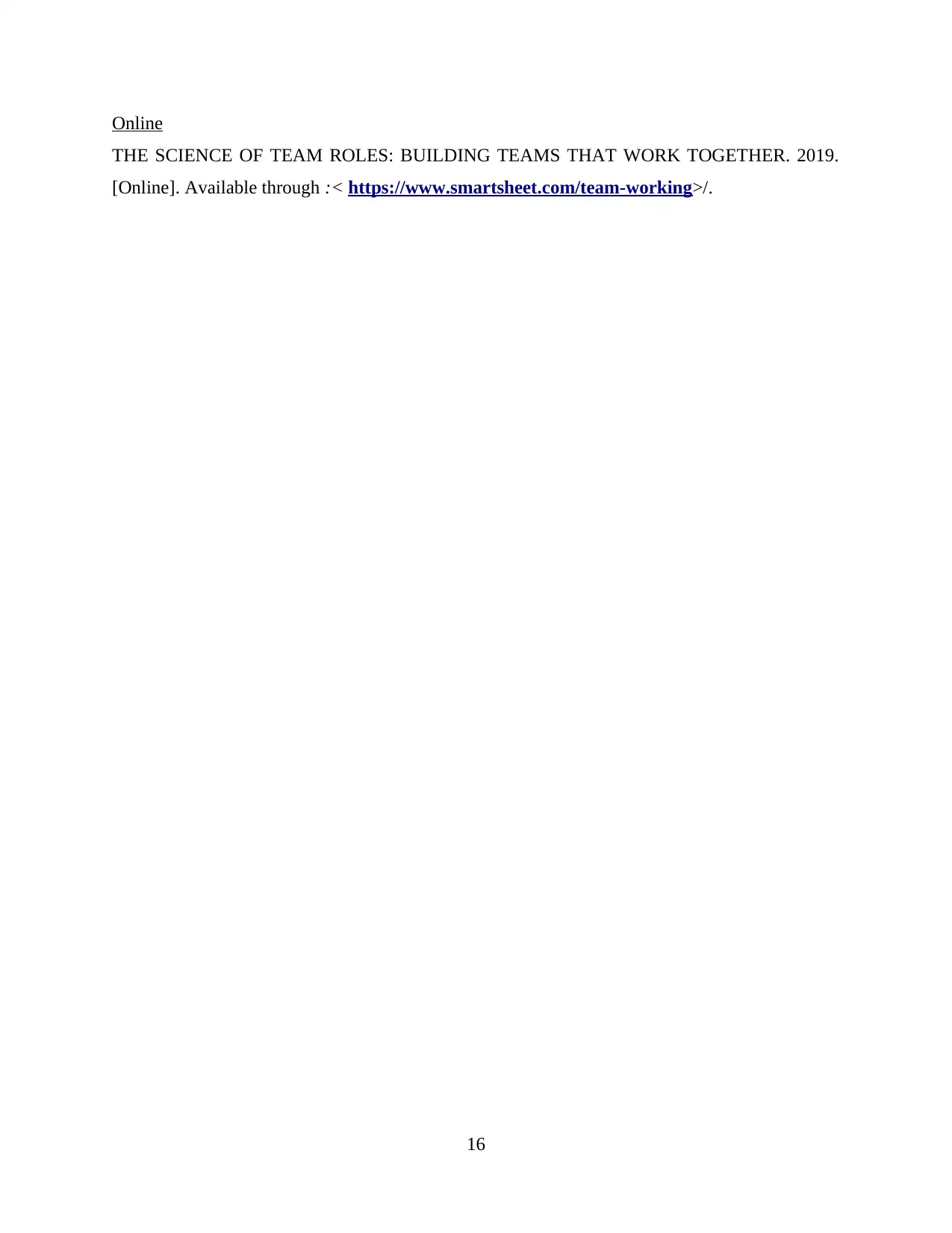
Online
THE SCIENCE OF TEAM ROLES: BUILDING TEAMS THAT WORK TOGETHER. 2019.
[Online]. Available through :< https://www.smartsheet.com/team-working>/.
16
THE SCIENCE OF TEAM ROLES: BUILDING TEAMS THAT WORK TOGETHER. 2019.
[Online]. Available through :< https://www.smartsheet.com/team-working>/.
16
1 out of 16
Related Documents
Your All-in-One AI-Powered Toolkit for Academic Success.
+13062052269
info@desklib.com
Available 24*7 on WhatsApp / Email
![[object Object]](/_next/static/media/star-bottom.7253800d.svg)
Unlock your academic potential
© 2024 | Zucol Services PVT LTD | All rights reserved.





